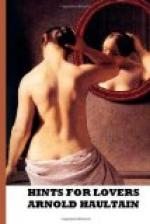Of all of which, what is the moral?—Humph! Frankly, I do not know what is the moral. Only this I see: that each little heart creates its own little universe: the bee’s, the that of its hive and the fields; man’s, that of his earth and the stars. What may be above or beyond the stars, man no more knows than the bee knows what is beyond the fields. The heart—be it man’s or a bee’s—is the centre of its self-made sphere. Some day, perhaps, man’s sphere will extend as far beyond the stars as today it extends beyond the fields. Then—who knows?—perhaps unlimited senses and an uncircumcised intellect may find themselves commensurate with this high-aspiring heart, and an emancipated and ecstatic Jack unite with a congenial Jill.
That there is a Universe, is apparent; that it is one and complete, we suppose; that there are in it Jacks and Jills, is indubitable; that these Jacks and Jills crave mutual support, sympathy, love, friendship, wifehood, sistership, companionship, brotherhood, is also indubitable. If therefore the whole scheme of the Universe is not a farce, what does this craving of Love for Lover mean? And yet,
It is quite impossible to conceive of a Universe of Love, in which all the claims of Heart and Soul and Senses shall be eternally and infinitely satisfied? Nevertheless, on this little earth, perhaps
Ill betides the heart that leans overmuch on another. For, alas! Not even the entire immolation of one heart for another will satisfy that other.—Indeed, indeed,
In this life, would one seek comfort and solace, one must seek it—in one’s own self, or in one’s God. For
Only one of two things can comfort: To put the world under one’s feet; or, to keep a God over one’s head: only
He who is “captain of his soul”, or he who commits his soul to God, can rise above fate.
There is a vacuum in every human heart. And the human heart abhors it as much as nature.
What will fill this cardiac void no mortal to this moment has found out. Art cries, “Beauty”, and tries to depict it; Philosophy cries, “Truth, and strives to define it; Religion cries, “Good”, and does its best to embody it; and numberless lesser voices in the wilderness cry, “Power”, or “Gold”, or “Work",—which is a narcotic, or “Excitement",—which is an intoxicant; and a many-toned changeful siren with sweetly-saddening music cries, “Love”. And one pursues a phantom, and another clasps a shadow, and a third cloaks his eyes with a transparent veil, or steeps his senses in floods that will not drown.—No, what the human heart wants it does not know. And, what is more,
Pathetic problem amongst problems pathetic, often it puzzles this human heart to distinguish between the things which it is right and proper to seek wherewith to fill that void, and the things which are wrong and improper. Furthermore:
How apt is the heart to seek in the illegitimate for the satisfaction which the legitimate fails to give!—Problems ancient as Eden.




